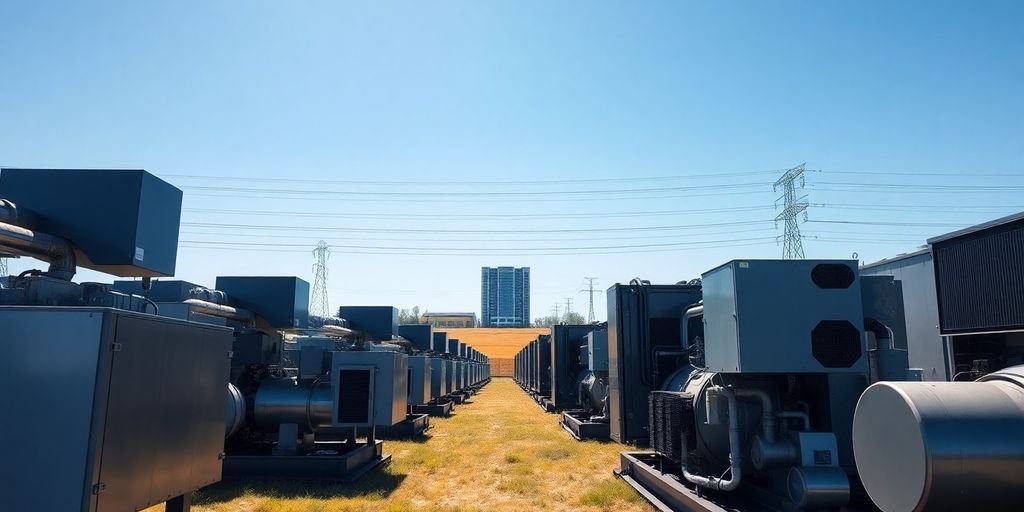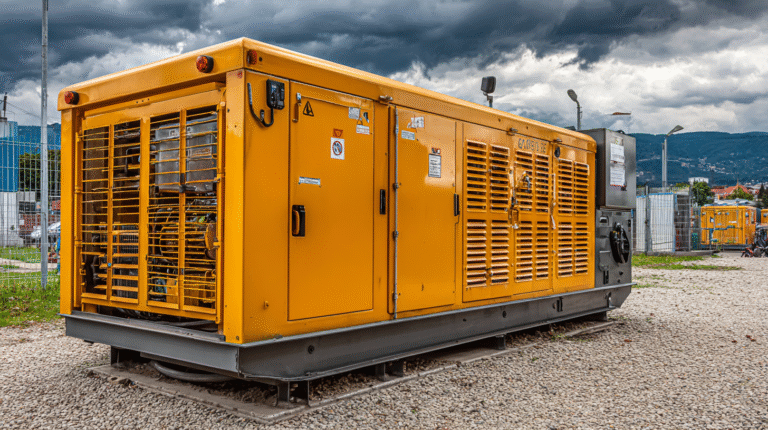Diesel Generators: Why Minnesota Rejected Amazon’s Plan for 250
Amazon’s plan to put 250 diesel generators at its new Minnesota data center just hit a big snag. State regulators aren’t going along with the company’s request to skip the usual permit process. This means Amazon has to jump through more hoops, which could slow things down a lot for their big project. It’s all about making sure things are done right, especially when it comes to power and the environment.
Key Takeaways
- Minnesota regulators said no to Amazon’s request for a fast pass on permits for 250 diesel generators.
- Amazon now needs a ‘Certificate of Need’ for its data center power, which is a longer process.
- People are worried about the pollution from all those diesel generators, and groups are speaking out.
- This decision might change how Minnesota handles energy for future data centers, pushing for cleaner options.
- Amazon has to figure out its next move, which could mean changing its plans for the data center.
Amazon’s Data Center Plans Hit a Roadblock
Minnesota Regulators Deny Permit Exemption
Amazon’s ambition to quickly establish a data center in Minnesota has encountered a significant hurdle. The Minnesota Public Utilities Commission (PUC) rejected Amazon’s request for an exemption that would have allowed them to bypass the standard permitting process. This decision throws a wrench into the company’s initial timeline and forces them to navigate a more complex regulatory landscape. It seems the fast-track approach they were hoping for is off the table, at least for now.
Proposed Diesel Generators Face Scrutiny
The core of the issue lies in Amazon’s plan to use 250 diesel generators as a backup power source for the proposed data center. These generators are intended to provide electricity during outages, ensuring continuous operation. However, the PUC is taking a closer look at the environmental impact and necessity of such a large number of diesel generators. The scrutiny is not just about the quantity but also the potential emissions and long-term sustainability. This is a big deal because:
- Diesel generators are known polluters.
- There are concerns about noise pollution.
- The PUC wants to explore cleaner alternatives.
Impact on Amazon’s Minnesota Operations
This regulatory setback could have several implications for Amazon’s operations in Minnesota. First, it will likely delay the opening of the data center. Second, it may force Amazon to revise its energy plan, potentially increasing costs. Third, it sends a message that Minnesota is serious about environmental regulations, even for major corporations. The hydrogen fuel cells are being considered as an alternative. It’s a reminder that even giants like Amazon aren’t immune to local regulations and community concerns.
The denial of the permit exemption underscores the growing tension between the need for data infrastructure and the imperative to protect the environment. It highlights the challenges companies face when trying to balance rapid expansion with sustainable practices.
The PUC’s Stance on Fast-Tracking

The Minnesota Public Utilities Commission (PUC) didn’t just say "no" to Amazon’s request; they really dug their heels in. It wasn’t a simple denial, but a clear message about how energy projects, especially ones with potential environmental impacts, need to be handled in the state. The PUC’s decision underscores the importance of regulatory oversight and public input when it comes to large-scale infrastructure developments. This decision could significantly shape the trajectory of Minnesota’s energy infrastructure.
Certificate of Need Requirement for Amazon
Amazon’s plan to install those 250 diesel generators? It triggered a specific requirement: a Certificate of Need. This certificate isn’t just a formality; it’s a comprehensive review process ensuring that any new energy facility is actually needed, cost-effective, and environmentally sound. The PUC basically told Amazon, "You can’t just build this without proving it’s necessary and won’t harm the environment."
Pushback Against Diesel Generator Exemption
Amazon wanted an exemption, a way to bypass some of the usual regulatory steps. The PUC wasn’t having it. They made it clear that no company, no matter how big, gets a free pass when it comes to environmental regulations. This pushback highlights the PUC’s commitment to fair and equal treatment under the law. It also sends a message to other companies looking to build similar facilities in Minnesota.
Regulatory Hurdles for Amazon’s Project
Amazon’s project now faces some serious regulatory hurdles. It’s not just about filling out some forms; it’s about demonstrating a genuine need, proving environmental safety, and addressing public concerns. The process for obtaining a Certificate of Need can be lengthy and complex, involving detailed studies, public hearings, and thorough review by the PUC. This process ensures that all voices are heard and all factors are considered before a decision is made. For those looking for reliable power, consider US-made diesel generators.
Environmental Concerns and Public Opposition
Community Concerns Over Diesel Emissions
Okay, so people living near the proposed data center aren’t exactly thrilled about the idea of 250 diesel generators kicking on, even if it’s just for backup. The main worry? Air quality. Diesel exhaust isn’t great stuff to breathe, and folks are concerned about the potential increase in particulate matter and other pollutants. It’s not just about the immediate impact either; there are worries about the long-term health effects, especially for kids and older adults. The noise pollution is also a factor. Imagine living near something that sounds like a construction site when the power goes out. Not ideal.
Advocacy Groups Challenge Amazon’s Proposal
Several environmental advocacy groups have stepped up to challenge Amazon’s plan. They’re arguing that the reliance on diesel generators goes against Minnesota’s goals for reducing carbon emissions and transitioning to cleaner energy sources. These groups are pushing for a more sustainable approach, like using renewable energy or investing in better battery storage. They’ve been actively involved in public forums, raising awareness about the potential environmental consequences, and putting pressure on regulators to reject the permit exemption. They believe that Amazon, as a major corporation, should be setting a better example.
Long-Term Environmental Impact
The long-term environmental impact is a big question mark. While Amazon says the generators will only be used as backup, there’s concern about how often they might actually be needed and the cumulative effect of those emissions over time. Climate change is already a major issue, and adding more fossil fuel-based power, even if it’s just for emergencies, isn’t helping. Plus, there’s the question of what happens to the generators at the end of their lifespan. Proper disposal and recycling are crucial to minimize any further environmental damage. The AP1000 SMR offers a cleaner alternative for long-term energy needs.
It’s not just about this one data center. People are worried that if Amazon gets away with this, it could set a precedent for other companies to rely on dirty energy sources, undermining the state’s efforts to build a more sustainable future.
Here’s a quick look at some potential environmental impacts:
- Increased air pollution
- Contribution to greenhouse gas emissions
- Potential water contamination from fuel storage
- Noise pollution affecting local communities
The Future of Data Center Energy in Minnesota
Shaping Minnesota’s Energy Infrastructure
The decision regarding Amazon’s data center project has broader implications. It’s not just about one company; it’s about setting the stage for how data centers will be powered in Minnesota moving forward. The state has an opportunity to shape its energy infrastructure in a way that aligns with its environmental goals.
Renewable Energy Alternatives for Amazon
Instead of relying on diesel generators, there are several renewable energy options Amazon could explore:
- Wind power: Minnesota has good wind resources.
- Solar energy: Solar is becoming increasingly affordable.
- Energy storage: Battery technology can help smooth out the intermittency of renewables.
Minnesota can become a leader in sustainable data center operations. By encouraging the use of renewable energy sources and innovative grid solutions, the state can attract businesses while protecting its environment.
Precedent Set for Future Data Centers
The PUC’s decision sends a clear message to other companies looking to build data centers in Minnesota. It signals that the state is serious about environmental protection and that data center growth must be sustainable. This could lead to:
- More careful planning by companies.
- Increased investment in renewable energy projects.
- Greater collaboration between data center operators and utilities.
Amazon’s Response and Next Steps
Amazon’s Options After PUC Decision
So, the Minnesota PUC said no to Amazon’s request to skip the usual permit process for those diesel generators. What does that mean for Amazon? Well, they have a few choices. They could try to play ball and go through the full Certificate of Need process, which is probably going to take a while. Or, they could try to tweak their plans and come back with a different proposal. Maybe fewer generators? Different kind of generators? Who knows. It’s also possible, though maybe less likely, that they could decide this whole Minnesota thing isn’t worth the hassle and look at other locations for their data center.
Potential Revisions to Amazon’s Plan
If Amazon decides to stick with Minnesota, expect some changes to their original plan. They might need to reduce the number of diesel generators they want to install. They could also explore alternative backup power sources, like batteries or even renewable energy storage. It’s also possible they’ll try to make their existing generators more efficient or cleaner-burning. The PUC is clearly concerned about the environmental impact, so Amazon will need to address those concerns head-on. It’s all about finding a solution that meets their needs while also satisfying the regulators and the local community.
Implications for Amazon’s National Strategy
This decision in Minnesota could have ripple effects for Amazon’s data center strategy across the country. If other states see Minnesota pushing back on diesel generators, they might start doing the same. That could force Amazon to rethink how they power their data centers and push them towards more sustainable solutions. It also highlights the growing importance of community engagement and environmental considerations when building these massive facilities. This isn’t just a Minnesota problem; it’s a sign of things to come for the whole industry.
This situation underscores the increasing scrutiny tech companies face regarding their environmental footprint. It’s not enough to just build data centers; they need to be built responsibly and with consideration for the local environment and community.
Here are some potential implications:
- Increased regulatory scrutiny in other states.
- Greater emphasis on renewable energy sources.
- More community engagement during the planning process.
Understanding the Certificate of Need

What is a Certificate of Need?
Okay, so a Certificate of Need, or CON, is basically a permit that’s required before you can build certain types of projects. It’s all about making sure there’s a real need for the project in the community. Think of it as a way for the state to control development and prevent overbuilding, especially when it comes to things like power generation. It’s not just about whether you want to build something, but whether the community actually needs it. It’s a regulatory tool used to ensure projects align with public interest and don’t negatively impact existing resources.
Why Amazon Needs This Certification
Amazon’s data center project needs a Certificate of Need because of the scale of the power it requires. Any facility that connects to the grid through transmission lines usually needs to get this certification. The state wants to make sure that the backup power source meets the threshold for the Certificate of Need. It’s not just about the data center itself, but also about the impact of those diesel generators on the grid and the environment. The European diesel genset market is also subject to similar regulations, ensuring responsible power solutions.
Process for Obtaining the Certificate
Getting a Certificate of Need isn’t a walk in the park. Here’s a simplified breakdown:
- Application: First, you have to submit a detailed application to the Public Utilities Commission (PUC). This includes all sorts of information about the project, like its size, location, environmental impact, and how it will affect the community.
- Review: The PUC then reviews the application, which can take a while. They’ll look at whether the project is actually needed, whether it’s the best way to meet that need, and whether it will have any negative impacts.
- Public Comment: There’s usually a period for public comment, where people can voice their opinions about the project. This is where community groups and advocacy organizations can weigh in.
- Decision: Finally, the PUC makes a decision. They can approve the application, deny it, or approve it with conditions. If it’s approved with conditions, you have to meet those conditions before you can start building.
The process is designed to be thorough and transparent, but it can also be lengthy and expensive. Companies need to be prepared to invest significant time and resources into getting a Certificate of Need. It’s not just a formality; it’s a real hurdle that can make or break a project.
What This Means for Minnesota and Beyond
So, what’s the big takeaway here? The Minnesota PUC’s decision to pump the brakes on Amazon’s diesel generator plan is a pretty big deal. It shows that state regulators aren’t just going to rubber-stamp whatever big companies want, especially when it comes to things that could affect the environment or local power grids. This whole situation could set a new standard for how data centers get built in Minnesota, and maybe even in other places too. It makes you wonder if other states will start looking closer at these kinds of projects. It’s a reminder that even huge companies like Amazon have to play by the rules, and sometimes, those rules are there for a good reason.
Frequently Asked Questions
What is the Minnesota PUC?
The Minnesota Public Utilities Commission (PUC) is a group that makes important decisions about things like electricity and gas in Minnesota. They have to make sure that these services are fair and safe for everyone.
What did Amazon want to do with 250 diesel generators?
Amazon wanted to put 250 diesel generators at its new data center in Minnesota. These generators would make electricity for the data center, especially when the main power goes out.
Why did the PUC say no to Amazon?
The PUC said no to Amazon’s request to skip some important steps. They want Amazon to get a ‘Certificate of Need’ first, which is like a special permission slip for big energy projects.
What is a ‘Certificate of Need’?
A ‘Certificate of Need’ is a document that shows a big energy project is really needed and is good for the public. It helps make sure that projects are planned carefully and don’t cause too many problems.
Why are people worried about diesel generators?
Many people are worried about the pollution that 250 diesel generators would cause. Diesel fumes can be bad for the air and for people’s health. Also, some groups want Minnesota to use more clean energy, not dirty energy.
What happens next for Amazon’s data center plans?
Amazon now has to go through the full process to get a ‘Certificate of Need.’ They might also try to change their plans to use less diesel or find other ways to power their data center, like with cleaner energy.








